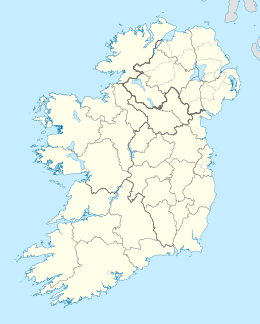Fota Island
| Native name: Oileán Fhóta | |
|---|---|
|
Location in Ireland
|
|
| Geography | |
| Location | Cork Harbour |
| Coordinates | 51°53′57″N 8°17′54″W / 51.89917°N 8.29833°W |
| Administration | |
| County | County Cork |
| Demographics | |
| Ethnic groups | Irish |
Fota (statutory spelling Foaty; Irish: Fóite) is an island in Cork Harbour, Ireland, just north of the larger island of Great Island. Fota Island is host to Ireland's only wildlife park – as well as the historical Fota House and gardens and golf course owned by the "Fota Island Golf Club and Resort". The island comprises two townlands both called Foaty: one each in the civil parishes of Clonmel (the western half of Great Island) and Carrigtohill (on the mainland).
Although Foaty is the spelling fixed in the nineteenth century by the Ordnance Survey of Ireland, Fota is now more common. The origin of the name is uncertain. It may be of Hiberno-Norse origin, with second element Old Norse oy "island"; Donnchadh Ó Corráin suggests fódr oy "foot island", from its position at the mouth of the River Lee down from Cork city; some medieval references have an -r- in the name. Ó Corráin is sceptical of proposed Gaelic etymologies, fód thige "sod house", fodh teith "warm sod", and feóidhte "decayed/withered".
Fota House was the former home of the Smith-Barry family (Earls of Barrymore since 1627), descendants of Philip de Barry. The de Barry family came from Wales as part of the Norman invasion of Ireland. The family were granted lands at Fota and elsewhere in 1185. The family first resided at Barryscourt Castle, Carrigtwohill, then at Castlelyons where they held extensive lands. Fota House was originally a hunting lodge and became the family's main residence in the 1820s when the architect, Sir Richard Morrison (1767–1849) and his son Vetruvius Morrison (1794–1838), created the present regency mansion with over 70 rooms.
...
Wikipedia

